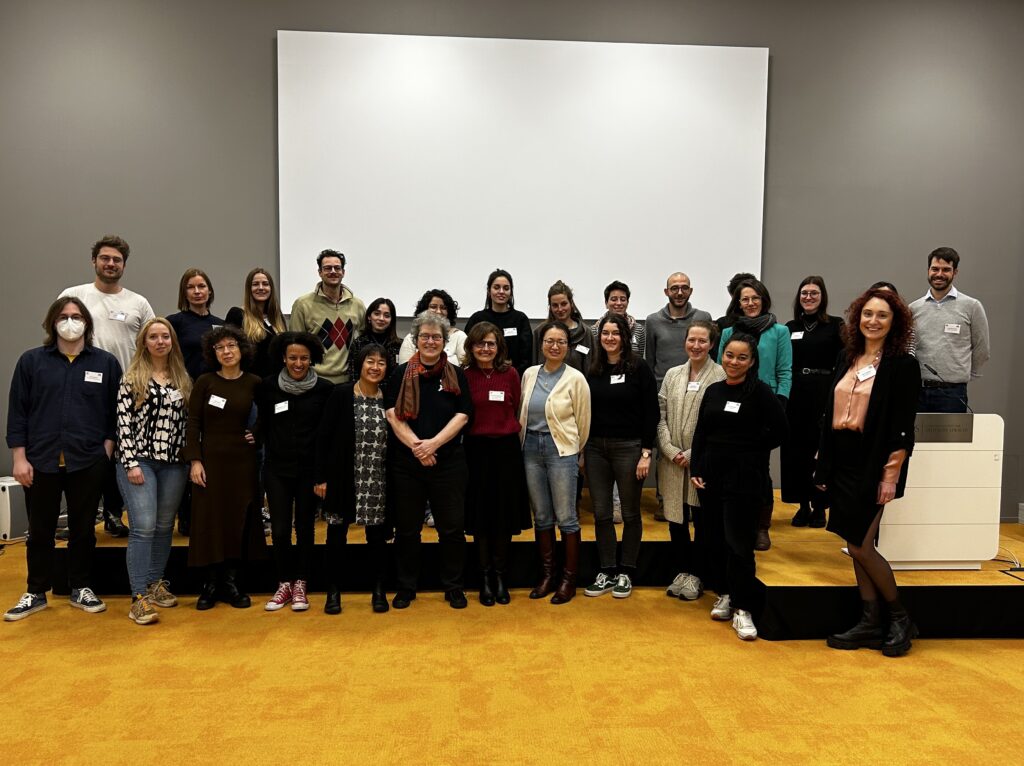Tabea Stolte & Sam Schirm
Improving methodological skills, learning and applying new innovative approaches as well as discussing one’s own data with experts: These were the goals of the GAL (Gesellschaft für Angewandte Linguistik e.V., Germany’s society for applied linguistics)-sponsored Research School “Interaction research in the context of methodological and technical innovation”, from November 23rd to 25th, 2023, at the Leibniz Institute for German Language (IDS) in Mannheim. Organized by Jowita Rogowska and Helena Budde, two PhD students at the IDS Mannheim, the fully booked research school was aimed at junior researchers in interaction research within Germany and abroad.
Day 1 – Moving Bodies
After a welcome event by Jowita Rogowska and Helena Budde, the first day focused on the analysis of “Moving Bodies” and the challenges it entails. Lorenza Mondada’s keynote looked at situated embodied moving actions and their specific temporalities in ongoing activities. She highlighted the fact that since early uses of film and video recordings for scientific purposes, movement was the center of attention. Mondada stressed the importance of a holistic view of interaction that considers both verbal and embodied behaviour. In her subsequent workshop “Studying the methodic and indexical order of actions: Requesting and fetching an object right now”, Mondada turned to the issue of collection building in the study of multimodal gestalts.
In the afternoon, three participants led simultaneous data sessions with their own data. Juman Al-qaoud presented video data on the topic “Post-positioned tag questions in pursuit of response in Jordanian Arabic”. Galina Gostrer presented video data from zoom calls on “See and be seen — noticing sequences in the virtual interaction space”. Finally, Miriam Schöps presented classroom interaction on the topic of “Negotiation and (collaborative) formulation of technical contexts in student discussions in system-oriented geography lessons”. Participants could attend the data session of their choosing.
Day 2 – Discovering a Candidate Phenomenon
The morning of the second day was devoted to how EMCA (Ethnomethodological Conversation Analysis) studies emerge from first observations. In her keynote “Discovering a candidate phenomenon”, Rebecca Clift described the different starting points from which a collection could be built. Clift recounted her own experiences in collection-building in which, over the course of her scientific career, similar cases, spread across different corpora, repeatedly arose. Clift also assured the participants that exciting examples are sure to find their counterparts. In response to the common question of “how big should a collection be”, Clift encouraged the early career researchers to continue looking for instances of the target phenomenon until additional instances stop teaching anything new. In the following workshop “Working with collections”, Rebecca Clifft and Alexandra Gubina worked through the steps from acquiring data to compiling and analyzing a corpus.
The afternoon was dedicated to the relationship between technology and transcription. In their presentation, “Transcription Software: History, Possibilities, Limitations”, Jacob Davidsen and Paul McIlvenny discussed the technical difficulties and solutions that researchers inevitably encounter when working with video and audio data, from recording hardware to file formats and transcription software. In their following workshop, Jacobson and McIlvenny gave a practical introduction to DOTE, the transcription software that they developed with the BigSoftVideo team in the Video Research Lab (VILA) at the Faculty of Social Sciences and Humanities at Aalborg University.
Day 3 – Coding Social Actions: Potentials and Problems
Building on the topics of collection building from the first two days, Alexandra Gubina and Arnulf Deppermann began the third day with their keynote on “Coding actions in social interactions: potentials and problems”. Using practical examples, Gubina and Deppermann illustrated the challenges and opportunities that coding offers EMCA research. They highlighted that the coding criteria emerge from analysis and collection building, and as such that coding is a later analytical step.
The afternoon was filled with a second block of parallel data sessions. Oliver Spiess led a session with video data on “Multimodal argumentation: reenactments in peer conversations among school children”. Afia-Ayélé Vissiennon led a data session on “Conversations about redeeming prescriptions in the pharmacy”. And Milene Mendes De Oliveira’s session discussed “Navigating unfamiliarity in intercultural groups”.
The final sessions of the research school were devoted to exchange between participants and the attending experts. In an expert coaching session, led by Elwys de Stefani, the experts used their collective experience and expertise to answer questions submitted by participants either during or in advance of the Research School. Questions covered the gamut from the distinction between Conversation Analysis and pragmatics, tips on writing academic articles, and the challenges of cross-linguistic studies. The participants then had the opportunity to discuss specific problems and difficulties in their own research process. The group coaching session was followed by the Research Café, which was a networking opportunity in a relaxed setting. These final sessions rounded off what was a truly innovative, motivating, and stimulating Research School.

Group photo of participants and presenters from the GAL Research School “Interaction research in the context of methodological and technical innovation”. Photo credit: Theresa Schnedermann, IDS-Mannheim
